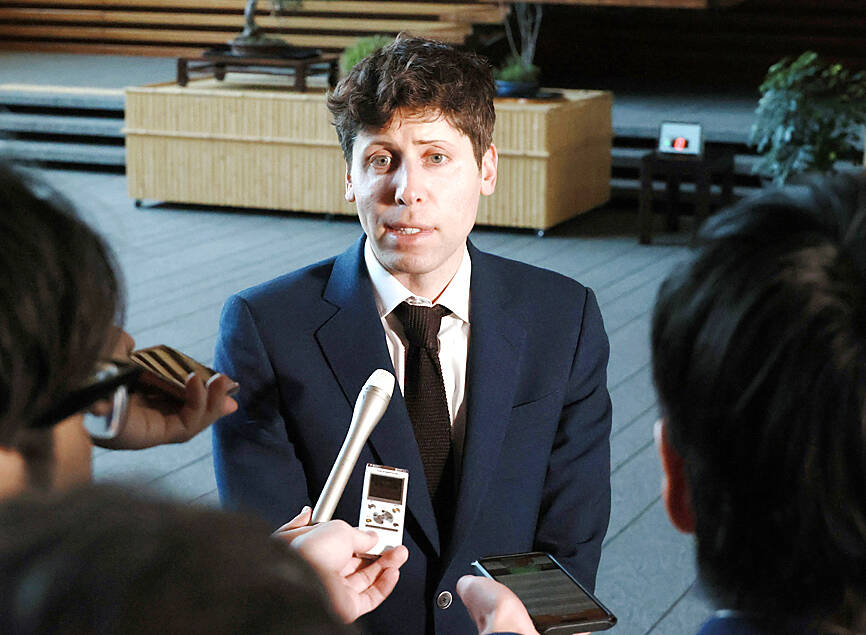Sam Altman, cofounder and chief executive officer of OpenAI, said the organization is looking at opening a Japan office and expanding Japanese-language services after meeting with Japanese Prime Minister Fumio Kishida.
“We hope to spend much more time, and engage with the wonderful talent and build something great for the Japanese people,” Altman told reporters in Tokyo yesterday. “It really is amazing to see the adoption of this technology in Japan.”
OpenAI has set off a frenzy of interest in artificial intelligence (AI) technologies since unveiling its ChatGPT service in November last year.

Photo: EPA-EFE
Microsoft Corp agreed to pour US$10 billion into the company and has integrated the technology into its Bing search engine. Google, the world’s leading search service, has responded with AI integrations of its own, while China’s SenseTime Group Inc (商湯科技) yesterday unveiled an AI-powered chatbot called “SenseChat” to challenge ChatGPT.
Altman said that he discussed the technology’s potential with Kishida, and how to mitigate the downsides.
They also talked about how to be thoughtful about the risks and how to make AI “as good for people as we can make it.”
Altman said OpenAI would work to make its models as good as possible in the Japanese language and for the Japanese culture.
“We’ll be back soon,” he said.
However, in China, shares related to AI plunged after a state media outlet urged authorities to step up supervision of potential speculation.
The ChatGPT concept sector has “signs of a valuation bubble,” with many companies having made little progress in developing the technology, the Chinese-language Economic Daily* wrote in a commentary.
Regulators should strengthen monitoring and crack down on share-price manipulation and speculation to create “a well-disclosed and well-run market,” reported the newspaper, which runs a Web site officially recognized by Beijing.
Companies should develop the capabilities they propose, while investors should refrain from speculating, it said.
CloudWalk Technology Co (雲從科技) tumbled a record 20 percent, while 360 Security Technology Inc (三六零安全科技) dropped by 10 percent, the most in three years. Beijing Haitian Ruisheng Science Technology Ltd (海天瑞聲科技) sank 15 percent.
“Generative AI is the hottest trend now and many tech companies will be launching their own versions in the coming months,” Union Bancaire Privee senior analyst Ling Vey-sern (凌煒森) said. “While valuations may rise to such news, the actual financial impact to these companies may be difficult to gauge at this juncture, and may lead to disappointment eventually.”

GROWING OWINGS: While Luxembourg and China swapped the top three spots, the US continued to be the largest exposure for Taiwan for the 41st consecutive quarter The US remained the largest debtor nation to Taiwan’s banking sector for the 41st consecutive quarter at the end of September, after local banks’ exposure to the US market rose more than 2 percent from three months earlier, the central bank said. Exposure to the US increased to US$198.896 billion, up US$4.026 billion, or 2.07 percent, from US$194.87 billion in the previous quarter, data released by the central bank showed on Friday. Of the increase, about US$1.4 billion came from banks’ investments in securitized products and interbank loans in the US, while another US$2.6 billion stemmed from trust assets, including mutual funds,

Micron Memory Taiwan Co (台灣美光), a subsidiary of US memorychip maker Micron Technology Inc, has been granted a NT$4.7 billion (US$149.5 million) subsidy under the Ministry of Economic Affairs A+ Corporate Innovation and R&D Enhancement program, the ministry said yesterday. The US memorychip maker’s program aims to back the development of high-performance and high-bandwidth memory chips with a total budget of NT$11.75 billion, the ministry said. Aside from the government funding, Micron is to inject the remaining investment of NT$7.06 billion as the company applied to participate the government’s Global Innovation Partnership Program to deepen technology cooperation, a ministry official told the

Taiwan Semiconductor Manufacturing Co (TSMC, 台積電), the world’s leading advanced chipmaker, officially began volume production of its 2-nanometer chips in the fourth quarter of this year, according to a recent update on the company’s Web site. The low-key announcement confirms that TSMC, the go-to chipmaker for artificial intelligence (AI) hardware providers Nvidia Corp and iPhone maker Apple Inc, met its original roadmap for the next-generation technology. Production is currently centered at Fab 22 in Kaohsiung, utilizing the company’s first-generation nanosheet transistor technology. The new architecture achieves “full-node strides in performance and power consumption,” TSMC said. The company described the 2nm process as

JOINT EFFORTS: MediaTek would partner with Denso to develop custom chips to support the car-part specialist company’s driver-assist systems in an expanding market MediaTek Inc (聯發科), the world’s largest mobile phone chip designer, yesterday said it is working closely with Japan’s Denso Corp to build a custom automotive system-on-chip (SoC) solution tailored for advanced driver-assistance systems and cockpit systems, adding another customer to its new application-specific IC (ASIC) business. This effort merges Denso’s automotive-grade safety expertise and deep vehicle integration with MediaTek’s technologies cultivated through the development of Media- Tek’s Dimensity AX, leveraging efficient, high-performance SoCs and artificial intelligence (AI) capabilities to offer a scalable, production-ready platform for next-generation driver assistance, the company said in a statement yesterday. “Through this collaboration, we are bringing two